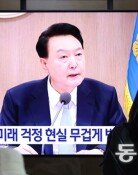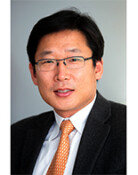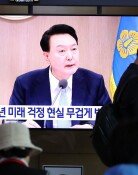Is U.S. Recognizing North Korea as a Partner in Bilateral Talks?
Is U.S. Recognizing North Korea as a Partner in Bilateral Talks?
Posted July. 30, 2005 03:06,
During a regular briefing at the White House on July 28, the White House spokesman engaged in verbal warfare with White House reporters.
The George W. Bush administration is recognizing North Korea as an official negotiation partner. Isnt that a fundamental change from its firm position?, reporters tenaciously asked. In view of the ongoing situation in which three rounds of bilateral talks between the U.S. and North Korea have so far taken place on the sidelines of the six-party talks held in Beijing, China, as well as the hours of the bilateral talks lasted for more than two to three hours, reporters were questioning whether Washingtons policy line toward Pyongyang has undergone a turnaround.
White House spokesperson Scott McClellan, however, replied with consistent answers, saying, We had bilateral talks, but they were not negotiations. The bilateral talks were merely held within the framework of the six-party talks. It is not true we contacted North Korea alone. The atmosphere to deflect peoples attention from the bilateral talks between the U.S. and North Korea, which the U.S. has so far denied in principle to the utmost, was plainly seen.
With these answers being repeated, some reporters denounced, The White House is afraid of admitting its policy change. Despite the White House flat denial, The Washington Post reported that some significant changes, including the Bush administration is almost abandoning its policy prohibiting bilateral talks with Pyongyang, are being seen.
The newspaper quoted Brookings Institution visiting fellow Jack Pritchard, who served as the U.S. special envoy to North Korea in August 2003 during the first Bush administration, as saying, If these incidents occurred a few years ago, related figures would be shot, with a queue being formed.
In response, however, a diplomatic source in Washington said, It is not significant to focus on the change of the formation of the talks, adding, It would be a misjudgment to assume that the U.S. would let up on its hawkish stance toward the reclusive country that has refused to scrap its nuclear programs just because the number of bilateral talks between Washington and Pyongyang has increased.
Meanwhile, in an interview with the Public Broadcasting Service (PBS), U.S. Secretary of State Condoleezza Rice said, I am ready to work for a long time until substantial progress is achieved, with my sleeves rolled up. It is being interpreted that the six-party talks might become long-term talks.
Seung-Ryun Kim srkim@donga.com
Headline News
- Israel prepares for retaliation against Iran
- Samsung reclaims top spot, surpassing Apple in smartphone market
- 77% of Koreans in 20s and 30s are 'Kangaroo Tribe' due to job crisis
- KBO referees embroiled in controversy over ABS decision concealment
- Inflation, oil price surge put double shock on global economy







